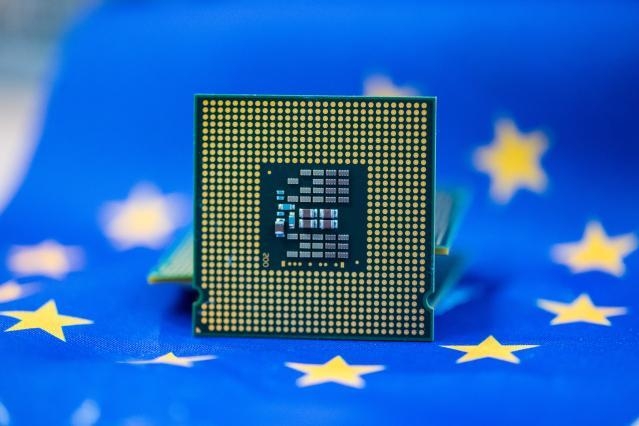The European Commission looks set to relax state aid rules for innovative semiconductor plants, under plans announced on Tuesday to help confront semiconductor shortages and strengthen Europe’s “technological leadership.”
The European Chips Act aims to bolster Europe’s competitiveness, resilience and help achieve both the digital and green transition.
It seeks to do this will be by mobilising more than €43 billion of public and private investments and set measures to prevent, prepare, anticipate and swiftly respond to any future supply chains disruptions.
By doing so, it is also expected to enable the EU to reach its ambition to double its current market share to 20 per cent in 2030.
The key elements of the scheme are:
- The Chips for Europe Initiative
- Will pool resources from the EU, its member states, and third countries associated with existing programmes, as well as private sector through the enhanced Chips Joint Undertaking.
- Will also see €11 billion made available to strengthen existing research, development and innovation, both in hardware and staff.
- Framework to ensure security of supply
- Will aim to steady European chip supplies by attracting investments and enhanced production capacities.
- These are, according to the Commission, “much needed” in order for innovation in advanced nodes, innovative and energy efficient chips to flourish.
- Additionally, a new Chips Fund will help facilitate access to finance for start-ups to help them mature their innovations and attract investors.
- It will also include a dedicated semiconductor equity investment facility under InvestEU to support scale-ups and SMEs to ease their market expansion.
- A coordination mechanism between member states and the commission
- Will monitor the supply of semiconductors, estimating demand and anticipating shortages.
- It will monitor the semiconductor value chain by gathering key intelligence from companies to map primary weaknesses and bottlenecks.
- It will draw together common crisis assessment and coordinate actions to be taken from a new emergency toolbox. It will also react swiftly and decisively together by making full use
The new initiative comes after global semiconductor shortages had a major effect on the economy during the COVID pandemic, as demand for electrical products using them increased at the same time as supply chain problems decreased their availability.
Car sales in Europe were hit particularly hard, with the European Automobile Manufacturers’ Association (EAMA) in October blaming concerning declined sales on the shortage.
In cars, semiconductors are used for driver assistance systems and computer management of engines, but they are also required for a significant chunk of consumer electronics.
Commission President Ursula von der Leyen commented on the plan, saying: “The European Chips Act will be a game changer for the global competitiveness of Europe’s single market.
“In the short term, it will increase our resilience to future crises, by enabling us to anticipate and avoid supply chain disruptions. And in the mid-term, it will help make Europe an industrial leader in this strategic branch.”
Valletta ranks 8th most expensive European capital city to live in – study
While London is the most expensive, Bucharest is the most affordable
KM Malta Airlines cancels flights between Malta and Paris on Thursday due to air traffic control strike
Impacted customers can opt for an alternative flight or apply for a full refund
WATCH: MEPs in dialogue – Financial institutions and over-regulation
This is the third in a series of debates designed to engage citizens in the lead-up to the MEP elections ...






